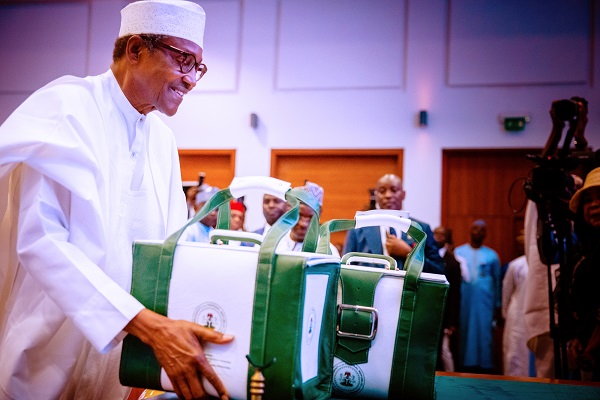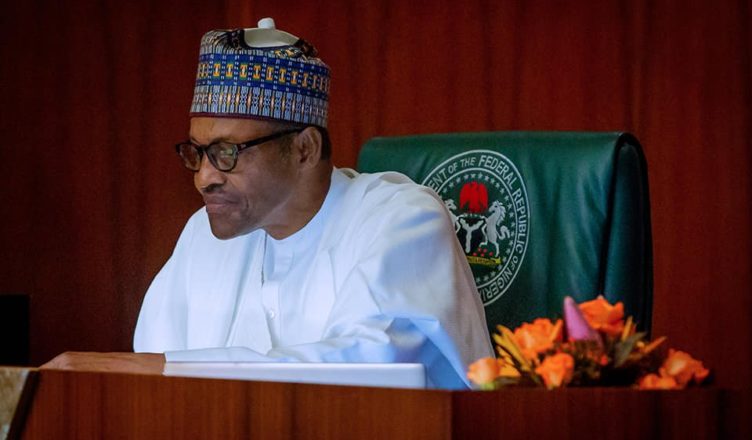•Fuel subsidy not sustainable, to be removed, govt insists •FG allocates N470b for revitalisation of tertiary institutions •N8.8 trillion to finance deficit; N6.3trn set aside for debt servicing •Buhari: We expect better understanding from university lecturers •Lawan seeks total war against oil thieves; Reps wants them charged with treason

With a record spending plan of N20.51 trillion in his last year in office, President Muhammadu Buhari yesterday warned that government would commence additional measures to cut the cost of governance and discontinue fuel subsidy.
Buhari said while government was mindful of the adverse effect on the society of drastic reduction in public spending, the current fiscal impact of petrol subsidy has “clearly shown that the policy is unsustainable.”
The president spoke while presenting to a joint sitting of the National Assembly the 2023 “Budget of Fiscal Sustainability and Transition”.
Senate President Ahmad Lawan said during the budget presentation that it was time government should declare a total war on crude oil stealing while House of Representatives Speaker Femi Gbajabiamila called for the treatment of those engaged in oil theft as committing treason against the country.
Buhari said the principal objective of the government in 2023 was “to maintain fiscal viability and ensure smooth transition to the incoming Administration,” and “it reflects the serious challenges currently facing our country, key reforms necessary to address them, and imperatives to achieve higher, more inclusive, diversified and sustainable growth.”
The proposed N20.51 trillion 2023 expenditure comprises the followings:
- Statutory Transfers of N744.11 billion;
- Non-debt Recurrent Costs of N8.27 trillion;
- Personnel Costs of N4.99 trillion;
- Pensions, Gratuities and Retirees’ Benefits of N854.8 billion;
- Overheads of N1.11 trillion;
- Capital Expenditure of N5.35 trillion, including the capital component of Statutory Transfers;
- Debt Service of N6.31 trillion; and
- Sinking Fund of N247.73 billion to retire certain maturing bonds.
- To finance the deficit mainly by new borrowings totalling N8.80 trillion, N206.18 billion from Privatization Proceeds and N1.77 trillion drawdowns on bilateral/multilateral loans secured for specific development projects/programmes.
The budget proposal includes N2.42 trillion spending by government-owned enterprises.
Details of the budget proposals show that the Ministry of Defence will receive N1,248,170,610,116; National Security Adviser N195,018,151,836; Ministry of Interior, N304,395,280,926; Ministry of Education, N1,078,421,185,229; Ministry of Health, N1,097,703,830,504; Independent National Electoral Commission (INEC) N50 billion; Ministry of Works and Housing, N356,031,701,295; and Ministry of Transportation, N126,532,023,138.
Government, according to him, expects a deficit of N10.78 trillion, representing 4.78 per cent of estimated GDP, above the 3 per cent threshold set by the Fiscal Responsibility Act, 2007.
He explained that government needed to exceed the threshold considering the need to continue to tackle the existential security challenges facing the country.
He said: “Over time, we have resorted to borrowing to finance our fiscal gaps.
“We have been using loans to finance critical development projects and programmes aimed at further improving our economic environment and enhance the delivery of public services to our people.”
He recalled the two economic recessions recorded during his tenure with a direct result of significant decline in the country’s revenue generating capacity.
On both occasions, he said government had to “spend our way out of recession, resulting in higher public debt and debt service.”
“It is unlikely that our recovery from each of the two recessions would have been as fast without the sustained government expenditure funded by debt,” he said.
Buhari said that in line with the plan to accompany annual budgets with Finance Bills, partly to support the realization of fiscal projections, current tax and fiscal laws/regulations were being reviewed to produce a draft Finance Bill 2022.
He noted that it is their intention that once ongoing consultations are completed, the Finance Bill 2022 would be submitted to the National Assembly to be considered alongside the 2023 Appropriation Bill.
On budget parameters and fiscal assumptions, he said the 2023 to 2025 Medium Term Expenditure Framework and Fiscal Strategy Paper (MTEF/FSP) sets out the parameters for the 2023 Budget as follows:
- Oil price benchmark of 70 US Dollars per barrel;
- Daily oil production estimate of 1.69 million barrels (inclusive of Condensates of 300,000 to 400,000 barrels per day);
- Exchange rate of N435.57 per US Dollar; and
- Projected GDP growth rate of 3.75 per cent and 17.16 per cent inflation rate.
On 2023 revenue estimates, he noted that based on the fiscal assumptions and parameters, total federally-collectible revenue is estimated at N16.87 trillion in the fiscal year.
“Total federally distributable revenue is estimated at N11.09 trillion in 2023, while total revenue available to fund the 2023 Federal Budget is estimated at N9.73 trillion.
“This includes the revenues of 63 Government-Owned Enterprises.
“Oil revenue is projected at N1.92 trillion, non-oil taxes are estimated at N2.43 trillion, FGN Independent revenues are projected to be N2.21 trillion. Other revenues total N762 billion, while the retained revenues of the GOEs amount to N2.42 trillion.
He said the 2023 Appropriation Bill was projected to maintain the focus of MDAs on the revenue side of the budget and greater attention to internal revenue generation.
Sustenance of revenue diversification strategy, he said, would further increase the non-oil revenue share of total revenues.
The President noted that to ensure fiscal sustainability, government will further improve the country’s business-enabling environment, accelerate current revenue-based fiscal consolidation efforts and strengthen the nation’s expenditure and debt management.
On financing infrastructure gap, he said Nigeria required a huge outlay of resources to close current infrastructure gaps and boost its economic performance.
Government, he said, would develop projects that are good candidates for Public Private Partnership (PPP) by their nature for private sector participation.
Buhari spoke of government’s disappointment at the “the crisis that has paralysed activities in the public universities in the country.”
He said: “We expect the staff of these institutions to show a better appreciation of the current state of affairs in the country. In the determined effort to resolve the issue, we have provided a total of N470.0 billion in the 2023 budget from our constrained resources, for revitalization and salary enhancements in the tertiary institutions.”
He added: “It is instructive to note that today Government alone cannot provide the resources required for funding tertiary education.
“In most countries, the cost of education is jointly shared between the government and the people, especially at the tertiary level.
“It is imperative therefore that we introduce a more sustainable model of funding tertiary education.
“The Government remains committed to the implementation of agreements reached with staff unions within available resources.
“This is why we have remained resolute that we will not sign any agreement that we would be unable to implement.
“Individual institutions would be encouraged to keep faith with any agreement reached in due course to ensure stability in the educational sector.
“Government is equally committed to improving the quality of education at other levels.”
The President said government was concerned about the high food prices in the country but explained that various measures were being taken to address structural factors underlying the issue.
He said government remained firmly committed to the security of life, property and investment across the country.
“Accordingly, defence and internal security continue to be accorded top priority in 2023. Current efforts to properly equip and motivate our valiant personnel in the armed forces, police and paramilitary units will be sustained,” he said.
He assured Nigerians that insecurity, especially banditry and kidnapping, will be significantly curtailed before the end of his administration.
“We will redouble our efforts to ensure we leave a legacy of a peaceful, prosperous and secured nation,” he said.
Oil thieves are Nigeria’s worst enemies, says Lawan
Senate President Ahmad Lawan said in response to the President’s budget speech that it was time government declared war on oil thieves, branding them Nigeria’s worst enemies.
Lawan said with the economy being assailed by dearth of revenues and the theft of one million barrels of crude per day, “I consider the oil thieves the worst enemies of our country.”
The thieves, according to him, “have declared war on our country and our people” and deserved the appropriate punishment.
He said: “Translated into monetary terms, our loss is monumental. The large scale and massive stealing of our oil is concerning as this reduces drastically the revenues available to government.
“With conflicting figures, projections have put our losses from this malaise at between 700,000 to 900,000 barrels of crude oil per day, leading to about 29 to 35 per cent loss in oil revenue in the first quarter of 2022.”
The Senate president also said that the figure represented an estimated total revenue fall from N1.1 trillion recorded in the last quarter of 2021 to N790 billion in the first quarter of this year.
He said: “The figures show we are not able to meet the Organisation of the Petroleum Exporting Countries’ (OPEC) daily quota of 1.8 million barrels per day.
”I strongly feel that if we do not take the necessary measures to stop the thieves immediately, our economy will be devastated, as efforts to provide infrastructure and diversify the economy will be thwarted.
“The idea of deploying our revenues from oil and gas to support diversification into real sectors like agriculture, manufacturing, mining etc is now under serious threat.”
Gbajabiamila: Treat oil theft as treason
The House of Representatives through Speaker Femi Gbajabiamila urged President Buhari to treat those engaged in oil theft as commuting treason against the country.
”It is the sense of the House of Reps that those engaged in these activities are agents of economic sabotage determined to bring our country to its knees,” he said.
He called for a swift and systemic overhaul the systems in place to protect the country’s oil and gas resources, adding that the arrangements in place were no longer adequate.
He said that there was an obvious need for improvements to stop the loss of income occasioned by the ongoing sabotage.
“This is especially so at this time when the conditions of our national finances require significant borrowing to finance government operations, sustain investments in infrastructure and national security and improve the living conditions of the Nigerian people.
“ It is noteworthy that Mr President, the President of the Senate and my good self, without comparing notes dwelt extensively on this subject. This underscores its importance and the imperative to act and act quickly.”
N8.8tr will not be set aside for debt servicing -DMO
Moments after President Buhari presented the budget proposal to the National Assembly, government clarified issues around government borrowings and debt servicing.
Buhari had stated that the federal government plans “to finance the deficit mainly by new borrowings totalling N8.8 trillion, N206.18 billion from privatisation proceeds and N1.77 trillion drawdowns on bilateral/multilateral loans secured for specific development projects/programmes”.
But responding to inquiries from The Nation, the Director General of the Debt Management Office (DMO), Ms. Patience Oniha, clarified that government did not “set aside borrowed funds to finance debt service”.
What that means is that as government makes money (revenue), a portion of the revenue will go into funding debt servicing.
Oniha said the 2023 budget would identify “those projects that will generate revenue”.
This was in response to the question as to whether there was a way some of these borrowings could be used to fund activities that generate revenue that will in turn minimise the dependence on borrowing.
Responding, she said there might be projects identified in the budget that will generate revenue.
Professor Uche Uwaleke of Nasarawa State University told The Nation that “the early presentation of the 2023 budget proposal is commendable as it ensures the sustainability of the return to the January to December budget cycle”.
He was happy that “the Finance Bill will be considered alongside the 2023 Appropriation Bill as well as the fact that the budget of Government Owned Enterprises is integrated to promote transparency”.
The professor sees the “oil price benchmark of $70 as conservative in line with budget principles. I also think the oil production benchmark of 1.69mbpd is realistic given the assurance by the President that the NNPC Limited is doing something to curb oil theft and pipeline vandalism”.
He however expressed concerns that the “capital expenditure as a proportion of total spending has gone down well below the government target of 30 per cent while debt service at over N6 trillion is in excess of amount budgeted for capital expenditure”.
Uwaleke argued that “the greatest threat to budget performance is the revenue side. This is why every effort must be made to improve revenue collection efficiency as well as monitor closely the MDAs and government independent revenues”.
Source: The Nation

